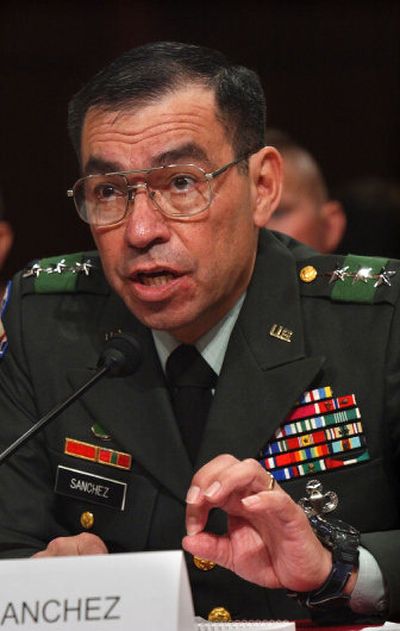Retired general calls Iraq a ‘nightmare’

WASHINGTON – Retired Lt. Gen. Ricardo Sanchez, who led U.S. forces in Iraq for a year after the March 2003 invasion, accused the Bush administration Friday of going to war with a “catastrophically flawed” plan and said the United States is “living a nightmare with no end in sight.”
Sanchez also bluntly criticized the current troop surge in Iraq, describing it as “a desperate attempt by the administration that has not accepted the political and economic realities of this war.”
“The administration, Congress and the entire interagency, especially the State Department, must shoulder the responsibility for this catastrophic failure, and the American people must hold them accountable,” Sanchez told military reporters and editors. “There has been a glaring unfortunate display of incompetent strategic leadership within our national leaders.”
Sanchez lashed out specifically at the National Security Council, calling officials there negligent and incompetent, without offering details. He also blasted war policies over the past four years, which he said had stripped senior military officers of responsibility and thrust the armed services into an “intractable position” in Iraq.
“The best we can do with this flawed approach is stave off defeat,” Sanchez said in a speech to the Military Reporters and Editors’ annual conference in Arlington, Va. “Without bipartisan cooperation, we are destined to fail. There is nothing going on in Washington that would give us hope.”
But Sanchez offered little advice about fixing military problems in Iraq, instead saying that current efforts generally need more resources and skill. “From a catastrophically flawed, unrealistically optimistic war plan to the administration’s latest surge strategy, this administration has failed to employ and synchronize its political, economic and military power,” Sanchez said.
Sanchez led Combined Joint Task Force 7 in Iraq beginning on June 15, 2003. Under his command, an insurgency erupted in Iraq and he and other top officers were slow to respond to it, in part because of the reluctance of then-Defense Secretary Donald Rumsfeld and other Bush administration officials to recognize its existence.
Some analysts have argued that Sanchez had little feel for strategy and permitted commanders to use tactics that were counterproductive and helped intensify opposition to the U.S. presence in Iraq.
But Sanchez may be best remembered for being the top general in Iraq during the period when the abuse of prisoners at the Abu Ghraib prison occurred and was later revealed.
Sanchez retired after more senior defense officials, fearing that a public confirmation hearing would go badly in light of the abuse allegations, decided not to give him a fourth star. He is now a senior mentor at the military’s Joint Warfighting Center.
A Pentagon spokesman declined to comment on Sanchez’s remarks.
NSC spokeswoman Kate Starr said: “We appreciate his service to the country. As General (David) Petraeus and Ambassador (Ryan) Crocker said, there’s more work to be done but progress is being made in Iraq. And that’s what we’re focused on now.”